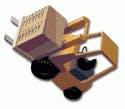New player comes up with innovative approach
Arlyn S. Powell, Jr.
Straightline Supply pioneers in international distribution.
Although the name "Straightline Supply" may be new to you, you have probably run into its CEO and founder, Ron Vogel, over the past two decades, during which time he has been associated with Paladin Tools, Ideal Industries, and his own recent start-up, Connex.
Vogel says he got the idea for his new company, Straightline Supply (Camarillo, CA), as he was selling Connex last year to Amphenol. Connex was established to sell Taiwan-manufactured coaxial connectors in the United States. The Taiwanese, apparently, make high-quality electronic products, but have a difficult time marketing them in this country because they do not understand the culture.
Vogel realized that about 85% of his Connex business was going directly to end users. This made Connex a high-growth business, at a time when coaxial products in general were experiencing only modest growth. The high growth led to Amphenol's initial interest in Connex, and the company's Taiwanese plant went to the buyer, along with the U.S. marketing and distribution company.
Vogel, however, had by then realized that he could leverage his Taiwanese connections into a still more ambitious undertaking, and the idea for Straightline Supply was born. "The name says it all," Vogel explains. "The concept is to go straight from the Taiwanese manufacturer to the U.S. customer."
Simple idea, but difficult to execute
Although the idea sounds simple, its execution has been anything but. First, Vogel identified half-a-dozen high-technology Taiwanese manufacturers and negotiated to be their sole distribution channel in the United States. "Our profile for our strategic partners is rigorous," says Vogel. "They must be ISO-9000 certified and a self-contained business from R&D through manufacturing. They must also have a successful track record at selling their products globally, and they have to want branding in the United States."
Having assembled a talented and experienced core of personnel for his new company, funded by first-round venture capital, Vogel is proceeding with the second phase of his plan. Each of his six Taiwanese strategic partners is having a separate brand created for Straightline that is likely to appeal to the U.S. contractor market. The Taiwanese products are then being sold directly to contractors via the Internet under their new names.
"We're starting out with datacom products," states Vogel, "but we expect eventually to add security and alarm, and electrical and cable-TV products. The common factor in all of these industries is that they share a common contractor profile."
The distributor's Website is already up (www.straightlinesupply.com), although Vogel says it won't be fully operational until November. The company also maintains a 20,000-sq-ft stocking facility in Camarillo, CA.
Practical questions arise
Several questions immediately arise: How do you make money with this kind of arrangement? How do you get the word out to contractors about your new product lines? Are the products themselves of high technical quality and standards-compliant? And, perhaps the most explosive question of all: How are bricks-and-mortar voice/data distributors likely to react to an online distributor?
Vogel is a careful businessman, and he has well-thought-out answers to each question. He says, for instance, that online distribution offers an "excellent profit model." The conventional selling cycle for an overseas manufacturer includes markups by the original equipment manufacturer (OEM) private-labeling the product, the distributor stocking it, as well as the manufacturer itself. "That's a 3x model," Vogel explains, "and so the price to the user is higher. If you leave out the OEM and distributor, you go from manufacturer through Straightline to the end user, a 1x pricing model. With this model, you can offer 30% to 50% savings to the contractor while still generating high profit for the manufacturer and Straightline."
Straightline Supply is launching significant but concentrated advertising campaigns using the trade magazines and trade shows serving the niche markets in which it is interested. The narrow focus of these specialized markets is, in itself, a significant factor in keeping down marketing overhead.
As for product quality and standards-compliance, Vogel points out that 95% of these Taiwanese connectors are already sold in the United States under private-labeling arrangements with OEMs, so the manufacturers are well-aware of American quality standards. Straightline is also working with ETL Laboratories to have the company's products performance-tested by a third-party organization.
And finally, Vogel says that, although six product lines initially will not be a broad offering, Straightline Supply will supplement its overseas commitments with partnering agreements in the United States. He will be able to undertake this partnering because many manufacturers in this country have begun to feel disenfranchised by the major voice/data distributors.
Existing distribution exclusionary?
"The large distributors have made a commitment to selectivity with programs like Levels and VIP," he adds. "This has angered many manufacturers. An alternative distribution channel is bound to open up for these excluded companies."
Vogel expects his relationship with the large bricks-and-mortar distributors to be hostile, but he doesn't seem worried. "I met with 32 Taiwanese companies in Taiwan last week," he states. "They want to do what the Japanese did in this country in the 1960s. They have great products, but they don't have the wherewithal to market them in the United States."
That is where Straightline Supply comes in. Vogel admits that he can afford to be open about his methods and plans, because, although his idea is simple in outline, it is also difficult to execute. But Vogel and his team are nothing if not ambitious: "I want to become the Sam Walton of industrial distribution," he laughs.

